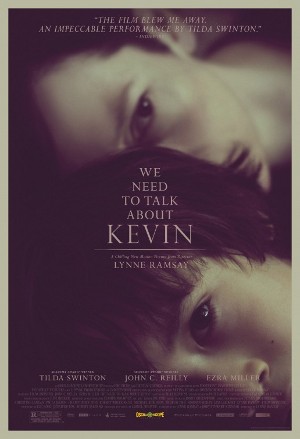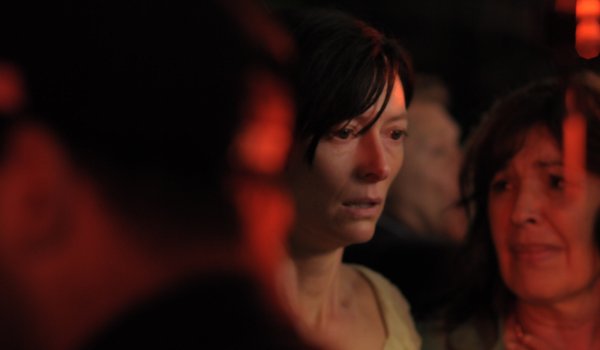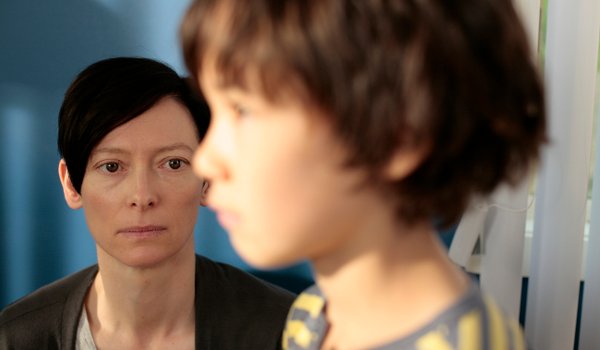- Title: We Need to Talk About Kevin
- IMDb: link


What if your child was responsible for a horrific event that changed not just the lives of your family but scarred entire community? Guilt-ridden and unable to leave and try to start a new life elsewhere, how would you go about your daily life knowing that any sense of normalcy was impossible?
Based on the novel by Lionel Shiver, We Need to Talk About Kevin, brought to the screen by writer/director Lynne Ramsay, focuses on the life of Eva Khatchadourian (Tilda Swinton) following the events of a school massacre caused by her teenage son Kevin (Ezra Miller). We watch as Eva becomes trapped in a series of events that unfold slowly destroying any chance she once had at happiness.
It’s an intriguing take that doesn’t examine the perpetrator of the crime or the specific series of events that led to the massacre, but instead gives us the perspective of the young man’s mother, who despite her love for Kevin, has known there’s something deeply wrong with her son for years.
The film’s structure mishmash of Eva’s current struggle living in a community where nearly everyone blames her for the actions of her son and memories from her past including her pregnancy, her postpartum depression, her resentment at his selfish behavior, and her increasing concern about her son’s detachment and cruelty.
Presented from Eva’s perspective the film is a character study of a woman living on the edge who is slowly broken down and eventually destroyed by the events surrounding her son. Despite her growing fears that there is something dangerously wrong with her son, she gets no help from a husband (John C. Reilly) who refuses to acknowledge son’s behavior even when Kevin’s actions appear to purposely cause harm to his little sister (Ashley Gerasimovich).
I’m not sure I buy into the suggestion, made both by the book and movie, that Kevin’s issues started because of the unenthusiastic nature of her pregnancy. But the film does a good job showcasing the conundrum Eva finds herself in, fearful of a son that despite his faults she still loves. Even in the end, after everything he’s done, Eva still refuses to abandon him. What little free time she has she spends mostly in silence visiting her son in prison or keeping his bedroom tidy just like he left it.
There are several nice touches throughout the film. My favorite is the sound cue of sprinklers which present an ominous foreboding before the discovery of some new awful piece of Kevin’s handiwork. How the film ties the sound to the night of the massacre works perfectly.
We Need to Talk About Kevin isn’t perfect. What little suggestion we get for Kevin’s odd behavior is never explored. And although Eva takes him to a doctor we never see her even consider taking her emotionally damaged son to a psychiatrist. It’s even harder to believe Kevin’s father didn’t have at least some inkling of his son’s issues. And although it changes after Celia’s accident, Eva’s willingness to let Kevin spend time with his little sister (who he treats even worse than you’d expect from a sullen teenager) is also troubling.
Although the film isn’t exactly fun, Lynne Ramsay does deliver a frank character study that will definitely spark discussion. Even though the film centers around a violent sociopath, most of the film’s violent moments are more suggested than shown. Even the school massacre is mostly viewed from the perspective of concerned parents and teens in the aftermath of the event.
Ramsay never celebrates the actions of Kevin, even when the boy himself seems particularly proud of himself. And Eva and her husband are both equal parts victim and instigator as Kevin’s actions are allowed to continue and become more and more bold over time. At the same time, even when his sins are laid bare to the world, Eva still can’t even bring herself to contemplate abandoning her son. Even in cases like Eva and Kevin, it seems a mother’s love knows no bounds.



I saw this at Fantastic Fest last year and it was one of my favorites. I have not seen any commercials for it which makes me think it may not be getting to many theaters. In fact, I don’t think it’s even coming to my town.